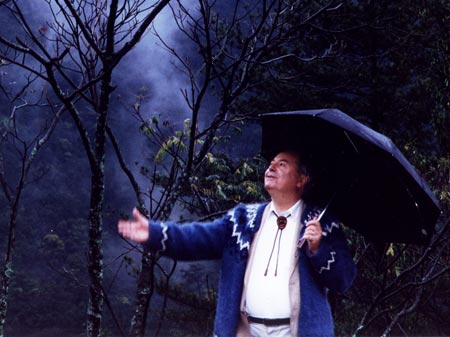This entry has been in the works for over a month, and although I’m not completely satisfied with it, today is probably the most appropriate day to post it.
In my recent explorations of Japanese temples and shrines, I’ve often thought about my dad, Julian Pas, who passed away five years ago today. He was a scholar of Chinese religions, and as my sister noted in a recent comment, he used to explore Taiwan with a motorbike and a camera. I had known he was an avid photographer—that’s probably where I got it from—but until Sonya told me, I hadn’t known about the motorcycle expeditions.
Even though this is Japan and not Taiwan, when exploring a traditional place of worship, I’ve wondered what he would have felt, and if those feelings would have been similar to mine. I’ve also wondered what sort of conversation we might have had about it. Curiosity, a sense of awe, reverence, and history, and a need to explore further and find out more. Not necessarily to practice the religious tradition, but to learn more about its adherents, their beliefs, and how their cosmology might fit into daily living.
This, combined with some other factors, has made me realize how much I miss him. I think the best way to describe the feeling is that it’s kind of like when you bruise yourself, and only remember the injury when the bruise gets bumped again in exactly the same place. Though I was emotionally prepared for the event of his death—he was ill for some months before he passed on, and had told me that he was satisfied with the fullness to which he’d lived his life—I find myself increasingly saddened by his absence. Not in a big way, but the number of times I have a question or a realization to share with him, or stumble upon some interesting joke or fact that would have interested him, I feel like the bruise has been bumped.
Lately I’ve been thinking about death and remembrance a fair bit. There have been a number of triggers, including the numerous Shinto shrine visits I’ve made in the past few months, where reverence for ancestors is a major part of the tradition. As well, seeing the crematorium area at the pet cemetery in early May made me think about my dad’s ashes. No, not because I thought of him as a pet, but because the equipment looked almost exactly the same. Another trigger was finding a review of one of his books that calls into question some of his scholarship. It made me bristle and get defensive on his behalf. It still pisses me off that someone would diss my dad.
I regret that he’s not here for me to phone up to answer my questions about Asian cosmology. Sometimes, when I’m looking through my shrine photos and I wonder something, I stop and realize that ten years ago, I could have simply picked up the phone and even if he didn’t have an answer, he’d know who to ask.
Re-reading this, I’ve realized that I sound extremely meloncholy. Which is not the case, so here, in random order, are some happy memories, which probably only a few of you know about. Beethoven symphonies and blown-out stereo speakers. Travelling through Belgium with a native guide. Watching a parade of trance mediums on a twilit summer evening in Taiwan. Soup. The knife-bending uncle. Bomma. Pesting. And puns. Terrible, awful groaners the likes of which I can’t imagine equalling in my lifetime.
Here’s an undated photo of Julian Pas, a man who saw a lot of the world, but lived on the Canadian prairies long enough to appreciate the joys of a good rain. The photo was taken at a mystery location in Taiwan by my sister Sonya.

Happy Father’s Day, a week in advance.
Thank you for sharing Ed.
I loved Julian’s gentle presence.
And that photo is is truly beautiful.
Much love,
James
Ed, thanks for sharing your memories of your father. Mine died just this past december so the bruise hasn’t healed yet. I appreciated hearing your reflections five years down the road.
Betsy
Good writing Ed! Thanks. In 1976, Julian spent a month in Kyoto researching Pure Land Buddhism while we went to Taiwan. One of the three Pure Land patriarch Dao Chuo ( I don’t know the Japanese pronounciation) was Japanese. Julian ‘s book Visions of Sukhavati is based on the first patriarch Shan-tao’s commentary…..,the beginning of the Amitaba worship.
A beautiful tribute. Here I sit with tears in my eyes … fathers lost, fathers found, fathers yet to be, a constant discovery of paternal connection. My bruise is almost 34 years old, an exquisite tenderness when bumped. Thanks, Ed, and Namasté.
That was beautiful Ed. Appreciate your sharing.
Dear Ed — what a wonderful tribute to Julian. It made me regret that we had not spent more time together, what a wealth of wisdom he was. Reminded me of when we were going to travel together through China in 1990 when Courtney was photographing for the Sacred Earth project, then Julian broke his ankle and couldn’t come, and then the prelude activities to Tiananman Square curtailed our plans to some extent. It would have been an amazing journey with him at our sides. Seeing his smile in this delightful picture makes me miss his enthusiasm and wonder for the world. Thank you for sharing this with us. Sherrill Miller and Courtney Milne